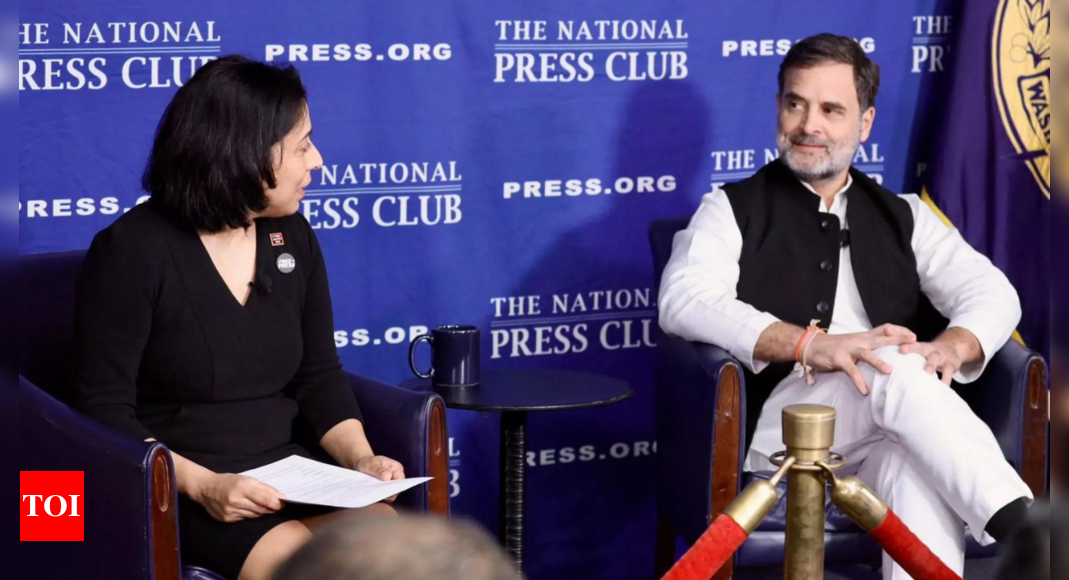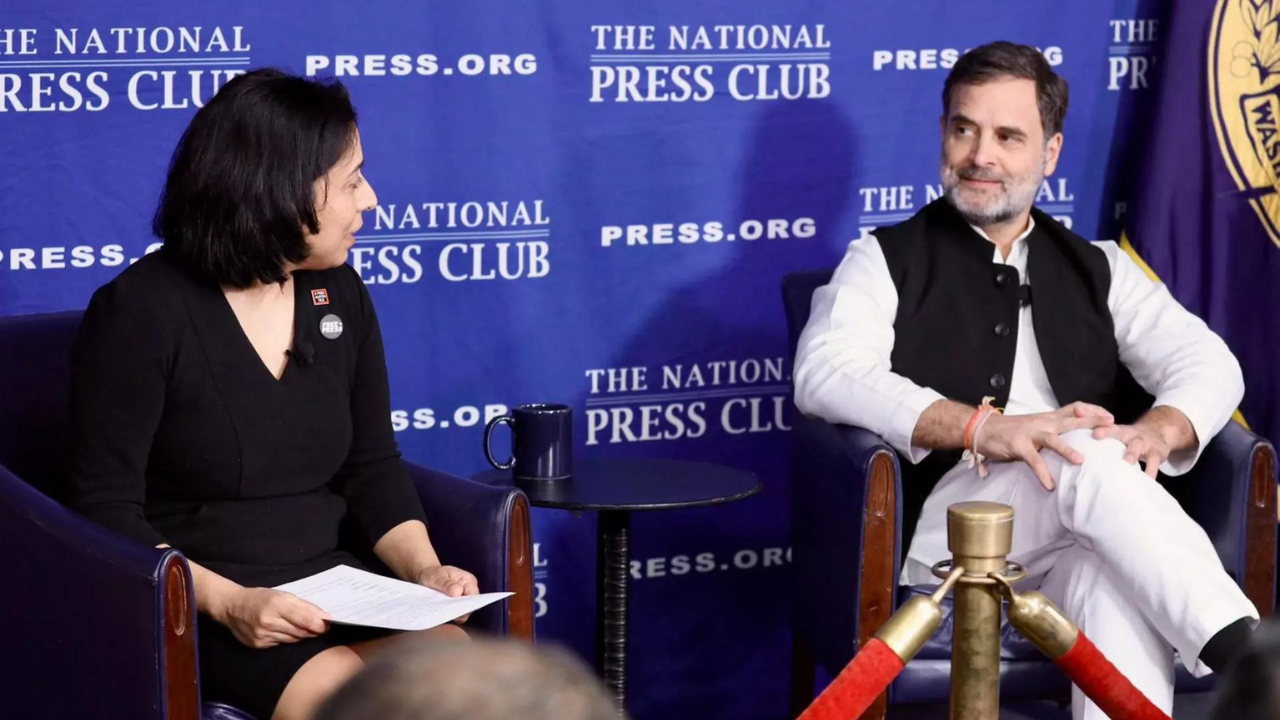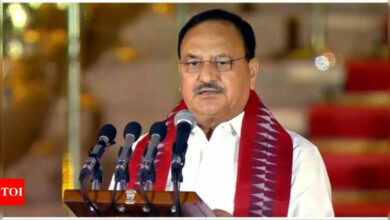India
PM Modi has not handled China well: Rahul Gandhi in Washington | India News – Times of India



NEW DELHI: Leader of the Opposition In the Lok Sabha, Rahul Gandhi criticised Prime Minister Narendra Modi and the Bharatiya Janata Party (BJP)-led government over the ongoing border clashes with China, saying the situation has been mishandled. Speaking at the National Press Club Gandhi said in Washington on Wednesday during his visit to the United States: “Chinese troops are occupying territory the size of Delhi in Ladakh, and I think that is a disaster.”
Rahul expressed concern over the presence of Chinese troops on Indian soil and wondered how a government could find the situation well managed. “We have Chinese troops occupying land the size of Delhi in Ladakh and I think that is a disaster. The media does not like to write about it. How would America react if a neighbouring country occupied 4,000 square kilometres of its territory? Would a president get away with saying that he has handled it well? So I don’t think Mr Modi has handled China well. I don’t see any reason why Chinese troops should be on our soil,” he said.
The border clashes between India and China have been ongoing since May 2020, when Chinese troops attempted to change the status quo along the border. Line of Actual Control (LAC) in eastern Ladakh. The conflict escalated with a violent clash between the two sides in the Galwan Valley. Since then, Indian troops have been stationed in forward positions, with over 50,000 troops along the LAC to prevent further Chinese incursions.
Gandhi also addressed broader issues of economic development, stressing the need for a decentralized, democratic view of production as opposed to China’s centralized production model. He criticized India’s current over-reliance on a service-based economy, arguing that the country cannot generate sufficient employment without a strong manufacturing base.
“We don’t want to do it the way the Chinese do it. We don’t want to do it in an environment that is not democratic, that is not liberal. So the real question for the 21st century, the Chinese have put a production vision on the table. It’s a non-democratic production vision. Can the United States and India answer that by putting a vision for production in a democratic free society? And I think there are a lot of answers there,” he said.
“If a country like India simply says we are going to ignore manufacturing and run a service-based economy, that means you cannot provide jobs for people,” Gandhi said. He called for a vision that embraces manufacturing in a democratic and liberal society, and stressed that both India and the United States have an opportunity to reclaim their roles as global producers.
Gandhi advocated supporting small and medium enterprises and reviving traditional industries across India. “Every area in India has its own manufacturing specialty. For example, Ballari in Karnataka has a deep textile industry that has been destroyed. We are looking at these pockets of excellence and trying to bring modern technology and financial support to build them up,” he explained.
He said that not producing enough means not enough jobs can be created. Rahul added that there is a huge opportunity for both India and the US to regain the capacity to produce.
“Here in the United States, the West, America, Europe and India, the West was the producer of the world. In the 1960s, if you wanted to buy a car, you bought an American car, washing machine, refrigerator… You were the pioneers in that. And somewhere along the line, America, India and the West decided that we are just going to stop. And we gave the whole thing to the Chinese. Now, for a country like India, to simply say that we are going to ignore manufacturing and run only a service-based economy, means that you cannot provide employment to people,” Rahul Gandhi said.
“I’m more interested in the act of production, also called manufacturing. Look at what most American, Indian, European countries do. They organize consumption. Uber organizes consumption. Organizing consumption is easy. Organizing production is a whole different story, much more complicated. You have to deal with things when you organize production that you just don’t have to deal with when you organize production. So to me, there’s a huge opportunity for India and the United States to get back that ability to produce,” he added.
In contrast to China’s model of large, centralized factories, Gandhi proposed a more decentralized system of production, equipping small and medium-sized enterprises with modern technology. His party is already testing some of these ideas in the Congress-ruled states of Karnataka and Telangana, with a focus on revitalizing traditional industries such as textiles.
Rahul Gandhi’s criticism of the Modi government also extended to domestic economic policies, particularly the concentration of wealth and power in the hands of a few large business conglomerates. He pointed out that the current economic model was monopolizing Indian industry and hurting the country’s productivity.
During his interaction, Gandhi also spoke about his role as leader of the opposition and the ideological battle between the INDIA alliance and the BJP-RSS. He vowed to defend India’s institutions and protect the rights of marginalised communities, including lower castes, tribes and minorities.
During his visit to the US, Rahul interacted with the Indian diaspora, students, teachers and American lawmakers. It was his first trip to the US since becoming the Leader of the Opposition in the Lok Sabha.
Rahul expressed concern over the presence of Chinese troops on Indian soil and wondered how a government could find the situation well managed. “We have Chinese troops occupying land the size of Delhi in Ladakh and I think that is a disaster. The media does not like to write about it. How would America react if a neighbouring country occupied 4,000 square kilometres of its territory? Would a president get away with saying that he has handled it well? So I don’t think Mr Modi has handled China well. I don’t see any reason why Chinese troops should be on our soil,” he said.
The border clashes between India and China have been ongoing since May 2020, when Chinese troops attempted to change the status quo along the border. Line of Actual Control (LAC) in eastern Ladakh. The conflict escalated with a violent clash between the two sides in the Galwan Valley. Since then, Indian troops have been stationed in forward positions, with over 50,000 troops along the LAC to prevent further Chinese incursions.
Gandhi also addressed broader issues of economic development, stressing the need for a decentralized, democratic view of production as opposed to China’s centralized production model. He criticized India’s current over-reliance on a service-based economy, arguing that the country cannot generate sufficient employment without a strong manufacturing base.
“We don’t want to do it the way the Chinese do it. We don’t want to do it in an environment that is not democratic, that is not liberal. So the real question for the 21st century, the Chinese have put a production vision on the table. It’s a non-democratic production vision. Can the United States and India answer that by putting a vision for production in a democratic free society? And I think there are a lot of answers there,” he said.
LIVE: Shri Rahul Gandhi speaks to the media at the National Press Club, Washington DC, USA.
“If a country like India simply says we are going to ignore manufacturing and run a service-based economy, that means you cannot provide jobs for people,” Gandhi said. He called for a vision that embraces manufacturing in a democratic and liberal society, and stressed that both India and the United States have an opportunity to reclaim their roles as global producers.
Gandhi advocated supporting small and medium enterprises and reviving traditional industries across India. “Every area in India has its own manufacturing specialty. For example, Ballari in Karnataka has a deep textile industry that has been destroyed. We are looking at these pockets of excellence and trying to bring modern technology and financial support to build them up,” he explained.
He said that not producing enough means not enough jobs can be created. Rahul added that there is a huge opportunity for both India and the US to regain the capacity to produce.
“Here in the United States, the West, America, Europe and India, the West was the producer of the world. In the 1960s, if you wanted to buy a car, you bought an American car, washing machine, refrigerator… You were the pioneers in that. And somewhere along the line, America, India and the West decided that we are just going to stop. And we gave the whole thing to the Chinese. Now, for a country like India, to simply say that we are going to ignore manufacturing and run only a service-based economy, means that you cannot provide employment to people,” Rahul Gandhi said.
“I’m more interested in the act of production, also called manufacturing. Look at what most American, Indian, European countries do. They organize consumption. Uber organizes consumption. Organizing consumption is easy. Organizing production is a whole different story, much more complicated. You have to deal with things when you organize production that you just don’t have to deal with when you organize production. So to me, there’s a huge opportunity for India and the United States to get back that ability to produce,” he added.
In contrast to China’s model of large, centralized factories, Gandhi proposed a more decentralized system of production, equipping small and medium-sized enterprises with modern technology. His party is already testing some of these ideas in the Congress-ruled states of Karnataka and Telangana, with a focus on revitalizing traditional industries such as textiles.
Rahul Gandhi’s criticism of the Modi government also extended to domestic economic policies, particularly the concentration of wealth and power in the hands of a few large business conglomerates. He pointed out that the current economic model was monopolizing Indian industry and hurting the country’s productivity.
During his interaction, Gandhi also spoke about his role as leader of the opposition and the ideological battle between the INDIA alliance and the BJP-RSS. He vowed to defend India’s institutions and protect the rights of marginalised communities, including lower castes, tribes and minorities.
During his visit to the US, Rahul interacted with the Indian diaspora, students, teachers and American lawmakers. It was his first trip to the US since becoming the Leader of the Opposition in the Lok Sabha.




